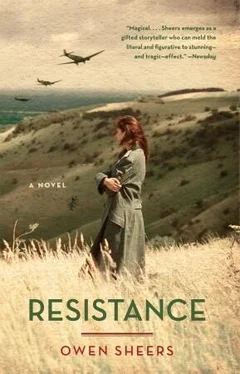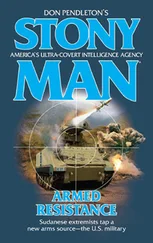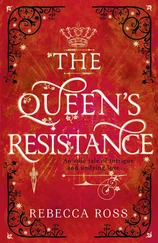As Sarah watched the ewe and lamb, the crease between her eyebrows deepened. The winter had taken a heavy toll on the flock and she couldn’t afford to lose any more. A week after the first thaw she’d ridden up on the mountain with Maggie to see the damage. Nearly all the sheep they hadn’t got down at the start of the winter had died. Some had been so hungry they’d eaten the wool off the backs of others. They’d even found a huddle of mountain ponies frozen together, still standing in a circle, their backs to the wind. “It’s their nature as kills ’em,” Maggie had said as they’d ridden past. “Won’t ever take shelter, see? Just huddle in like this an’ wait.” The few sheep still alive stood motionless, their ragged coats hanging like wet rugs over their backs. Murders of crows floated above them, biding their time until one of them would finally drop to its knees and lie down.
Once lambing started they’d lost even more. At first hardly any of the ewes took their lambs. They just wandered off, the afterbirth still trailing behind them. The grass was black and poached and they didn’t have the energy to suckle the bleating bundles of legs and bones struggling on the ground behind them. But gradually their strength and instinct had returned and they began to feed their offspring. Last week had seen several strong lambs born. It was still sometimes too much for the ewes, though, which is why this one was an orphan. Just moments after Sarah had pulled it free of its mother, the ewe had laid down her head and died.
“The dogs?” Albrecht said. “How do they help?”
“We put the dogs in with them,” Sarah said, not taking her eyes off the lamb in the pen. “The lamb’s got t’feed first, without the ewe scenting it. Then we put the dogs in.”
The lamb tottered towards the ewe, moving awkwardly under the weight of its new skin. It let out a reedy bleat, lifting the ewe’s head from her grazing.
“And what do they do? The dogs, I mean?”
Sarah turned to look at Albrecht, the ghost of a smile across her lips. He’d been more like this recently. Like a boy, understanding nothing but wanting to know everything.
“The dogs,” she said, turning back to examine the ewe and lamb again. “They’re a threat. Ewe’s instinct is t’take the lamb, protect it.”
“And that’s enough?”
“Should be. Once it’s fed a bit.”
Albrecht nodded then watched in silence with Sarah. There was that same equation again. The give and the take, protection in exchange for fear, a dead lamb skinned so this one may live. If this was always the pattern then perhaps it would apply to them too. Wasn’t the war like those dogs? Its teeth bared outside these steep hills? But then who were the orphans? The women, abandoned, or him and his men? It didn’t matter. What did was that instinct. The instinct of a ewe to protect one of its kind, the instinct that would force them, against the weight of all the years of war, to recognise their shared humanity.
But with Sarah there was another instinct too; he knew that now. Over the past weeks they’d spoken about the men again, about Tom and the others. Early one morning, when he and Alex had come over before dawn to help with the lambing, Sarah had asked him what else he knew. They’d spoken openly, more openly than they ever had before, as if those hours prior to daylight were not yet the day itself, and so neutral territory. He’d told her about the bunker outside Oxford, describing in detail its construction and supplies, hoping this would make her feel better about her husband’s possible situation. She’d nodded as he spoke, as if he were confirming what she’d already seen for herself. He didn’t mention the men who’d occupied that bunker he stood in, the men he’d seen marched out onto that village green, and she hadn’t asked.
He wanted to tell her she was holding on to nothing. That her husband and the others were probably dead before the patrol even entered the valley. Badly designed air vents, faulty explosives, a mis-set timer, tracker dogs, the Gestapo, the SS, informers, that unending winter: any of these could have killed them by now. But he remained silent and hoped instead events beyond the valley would do his talking for him.
The old woman’s wireless was, once again, picking up news broadcasts. The original home frequencies had been reactivated by the new administration. It was clear, however, that although the announcer’s voice was unerringly English, this was no longer the pre-invasion BBC. As such, the messenger was as eloquent an illustration of how the world had moved on as the message itself.
In America, Roosevelt had lost the November elections to an increasingly isolationist Republican Party. The new president, Dewey, had, like millions of Americans in the face of the Allies’ failures and losses in Europe, reverted to his 1940 views. Roosevelt, he told the American people, had led the United States into a war that was not hers to fight; a European war of imperialism in which not one American boy should have died. Following Japan’s act of aggression, America would still secure her rights and safety in the Pacific and along her Pacific coast, but with words as well as weapons; with diplomacy not deaths. More bloodshed was not the way forward. In keeping with this approach, negotiations with Berlin would begin immediately. Any active American units still fighting in Europe would be ordered to withdraw. Roosevelt’s sabre-rattling and the refusal of his War Department to warn the commanders of Pearl Harbor, despite their ability to read the Japanese diplomatic codes, had led to the Japanese attack that had in turn led America into war. Now it was time for Dewey to lead her into peace.
Closer to home Butler’s government in Harrogate had begun the first steps towards rebuilding a shattered Britain. The first British prisoners of war were released from German camps, having signed agreements of nonaggression towards their new rulers. New semi-military home organisations had been established to “put Britain back on her feet.” Air Chief Marshal Sir Arthur Harris of Bomber Command had been taken to Berlin to stand trial for war crimes against the German Reich.
The country, however, although occupied and no longer officially at war, was still far from settled. The wireless also carried reports of the ongoing “insurgency” in the north and west and even broadcast a blustering speech made by an ailing Churchill in Canada. Albrecht couldn’t tell if these reports were true or whether they were German propaganda, the necessary friction required by the administration to justify their actions. In the end, he realised this didn’t matter either. Fact or fiction, these reports were still enough. Enough for the women to want to keep their missing husbands a secret and for him and his men to want to remain out of those teeth of the war.
The lamb reached the ewe and began butting its head in the crook of her hind leg. The ewe, in response, bent to smell the lamb’s back. She lingered over the skin, scenting the dried remains of her own amniotic fluid. The lamb, shaky on its legs, kept up its jutting motion under her stomach. The ewe sniffed once more about its tail, then lifted her head and walked away to graze again.
Sarah let out a heavy sigh. “She’s rejected it,” she said, shaking her head. “Even with the bloody skin on, she didn’t take it.”
The lamb, bleating thinly and shaking its tail, followed the ewe, but when it reached her she walked away again, oblivious to its cries, as if she were alone in the pen.
Mary sent Bethan away today. Over to Hay to her cousins. She doesn’t even know if they are still there. She gave Bethan a note and a packed lunch and that was it. I saw them walk past on the old track this morning, then later Mary walked back on her own. Mary swears Bethan won’t say anything. Maggie was set against it but Mary was having nothing of that. She was sure Bethan shouldn’t stay here any longer .
Читать дальше












